Robert Forster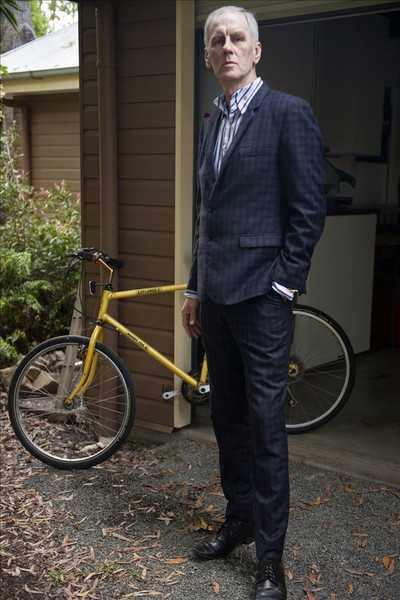 | ||
| Allmusic Biography : Although commonly considered the darker, artier half of the creative force of the Go-Betweens -- the John Lennon to Grant McLennans Paul McCartney, as it were -- singer, songwriter, and guitarist Robert Forster has always had a knack for crafty pop songs along with the brooding ballads he contributed to the Go-Betweens albums, while his solo career -- that began with 1990s Danger in the Past, released after the first Go-Betweens split in 1989 -- blended a healthy mix of both styles. By the time the band reunited in 2000, Forster had issued four solo albums beginning with 1993s Calling from a Country Phone (1993). The bands reunion in 2000 netted three critically acclaimed albums before McLennans untimely death in 2006 from a heart attack in his sleep; he was 48. Forster soldiered on as a music journalist and an author. He resumed recording with 2008s The Evangelist (that included three songs by McLennan), which sold better than his earlier solo dates. He issued Songs to Play in 2015, and published Grant & I: Inside and Outside the Go-Betweens the following year. After a playing and reading tour, he released Inferno in 2019. Forster, a native of Brisbane, Australia, formed the Go-Betweens with McLennan at Queensland University in 1978. The duo kept the band going through six albums by nearly as many lineups, progressing from stark Factory Records-style art rock to the creamy commercial pop of their last album, 1990s 16 Lovers Lane. The group split up during the sessions for that albums follow-up, and Forster took the songs he had written for it and recorded them with fellow Australian expatriate Mick Harvey (ex-Birthday Party) in Berlin, with members of Nick Caves Bad Seeds in the backing group. A return to the bleak starkness of the early Go-Betweens, 1990s Danger in the Past sounds like a creative rebirth for Forster, who had been disappointed with the slick sound of the last couple of Go-Betweens records. If Danger in the Past is a stylistic cousin to the Go-Betweens Before Hollywood, then 1993s Calling from a Country Phone is the equivalent of the groups superb mid-period albums like Liberty Belle & the Black Diamond Express. Largely ditching the uneasiness of Danger in the Past, the follow-up returns to the kind of quirky but richly melodic folk-rock that Forster does so well. During the sessions for that album, Forster began working on an album of covers, which was released the following year as I Had a New York Girlfriend. Reuniting with Harvey and the Bad Seeds Conway Savage, Forster completely reworks the songs in his own image, with the result that songs ranging from Hearts commercial schlock "Alone" to Martha & the Muffins new wave classic "Echo Beach" sound like Forster originals. Released in 1996, Warm Nights continues Forsters artistic winning streak. Produced by Forsters old friend Edwyn Collins, the album adds strings and brass to Forsters songs and sounds not unlike a lower-fi version of the Go-Betweens last two albums. The stripped-down production helps the songs immensely. At that point, Forster and McLennan started working together again, first releasing the career-spanning compilation Bellavista Terrace and the primal 78 til 79: The Lost Album in late 1998, and then touring the U.S. and recording The Friends of Rachel Worth, the first new Go-Betweens album in a decade. Three more albums and a concert DVD appeared from the reunited band before McLennans death in 2006. Forster released his first solo project in nearly a dozen years, The Evangelist, in 2008, and it contained the last songs that he and McLennan worked on together. Although further material was not forthcoming, Forster remained busy during the late 2000s and 2010s. He produced albums by fellow Brisbane bands the John Steel Singers and Halfway; worked as a music critic for the Australian magazine The Monthly (and collected his writing in the book The 10 Rules of Rock and Roll), and compiled the box-set series G Stands for Go-Betweens. Finally, in September 2015, he released a new collection, Songs to Play, with help from Scott Bromiley and Luke McDonald of the John Steel Singers. In 2016, Penguin finally published Grant & I: Inside and Outside the Go-Betweens, Forsters account of the long friendship and partnership with McLennan that had been rumored to be in the works for nearly a decade. In 2018, Forster reunited with producer Victor Van Vugt in Berlin. He had been the engineer on Danger in the Past. Backed by a rock quartet, the energetic recording entitled Inferno included nine new songs, including a rendering of "Crazy Jane on the Day of Judgement," based on W.B. Yeats poem of the same name that he had first performed live in Dublin in 2013 at the poets 150th birthday celebration. Inferno was issued by Tapete in early 2019. | ||
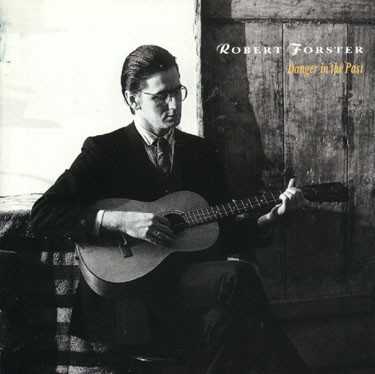 | Album: 1 of 8 Title: Danger in the Past Released: 1990 Tracks: 9 Duration: 38:24 Scroll: Up Down Top Bottom 25% 50% 75% Spotify Allmusic Wikipedia AlbumCover | 1 Baby Stones (04:06) 2 The River People (03:25) 3 Leave Here Satisfied (04:59) 4 Heart Out to Tender (04:14) 5 Is This What You Call Change (02:38) 6 Dear Black Dream (06:04) 7 Danger in the Past (04:50) 8 Ive Been Looking for Somebody (04:19) 9 Justice (03:45) |
| Danger in the Past : Allmusic album Review : Forsters solo debut saw him reinvented a touch as the classic traditionalist -- certainly the cover photo, black and white with him dressed in a neat suit, looks like it could have been taken somewhere in rural America circa 1920. For all that, Forster himself wasnt sounding like an unearthed wax cylinder recording from the back of beyond -- Danger in the Past, if anything, continues from where the Go-Betweens had temporarily stopped, with literate, understated rock & roll still the driving focus. Away from McLennan, a full album of Forsters gently cracked, high vocals succeeds better than might be thought, setting and maintaining a variety of moods from sudden energy to soft rumination, especially evident on the death-haunted title track. Perhaps the secret to the albums success partly lies in his collaborators -- fellow Australian music legend Mick Harvey took some time off from working with Nick Cave to produce and play, bringing fellow Bad Seeds vets Thomas Wydler and Hugo Race with him. Wisely, nobody tries to sound like Saint Nick, least of all Forster himself -- this is his own reflective, quietly energetic vision and style through and through, and his fellow performers play to his strengths. Theres a strong element of country & western in Danger in the Past, generally avoiding brawling honky tonk in favor of an elegant, almost studied high and lonesome approach not far off from Bob Dylans own experiments in the field. Certainly the roiling Hammond organ background behind the acoustic guitar on the lovely, haunted "The River People," later covered with equal talent by the Walkabouts, hints at something the Band could have done, and why not? Forsters wry sense of humor is clearly evident as well, as on this line from the stop-start shuffle "Dear Black Dream": "Wondering who sings better in the dark/Is it Townes Van Zandt or Guy Clark?" | ||
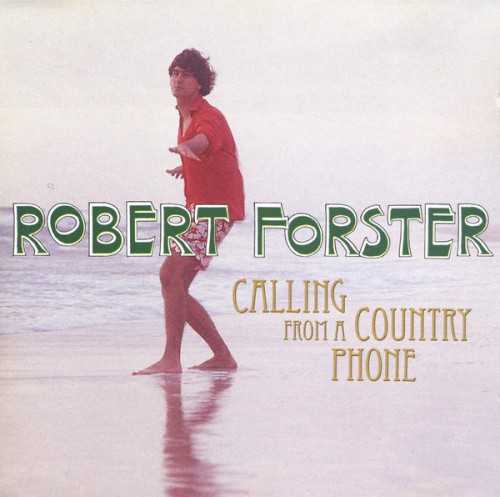 | Album: 2 of 8 Title: Calling From a Country Phone Released: 1993 Tracks: 10 Duration: 38:16 Scroll: Up Down Top Bottom 25% 50% 75% Spotify Allmusic Wikipedia AlbumCover | 1 Atlanta Lie Low (03:13) 2 121 (03:29) 3 The Circle (03:44) 4 Falling Star (04:05) 5 I Want to Be Quiet (03:34) 6 Cats Life (03:52) 7 Girl to a World (04:18) 8 Drop (04:08) 9 Beyond Their Law (05:03) 10 Forever & Time (02:48) |
| Calling From a Country Phone : Allmusic album Review : Calling From a Country Phone is sometimes referred to as Robert Forsters "country" album, but the folk-rock sound (with occasional pedal steel) recalls Felts Me and a Monkey on the Moon more than anything that has ever come out of Nashville. Forsters no-frills production suits his idiosyncratic and dramatic style, which requires very little in terms of accompaniment for its effect. "Atlanta Lie Low" seems too low-key to open an album, but it is immediately followed by "121," an unusually straight rocker on which Forsters delivery actually suggests Elvis Presley at times. "Drop" was the albums single, a dynamic song that deserved to be heard but would have found no place on the charts of the day, and "Falling Star" is just as good. Calling From a Country Phone is the only one of Forsters solo albums that was never released in the U.S., which is both disappointing and understandable since it probably would not have gained an audience beyond the adulatory cult surrounding the Go-Betweens. | ||
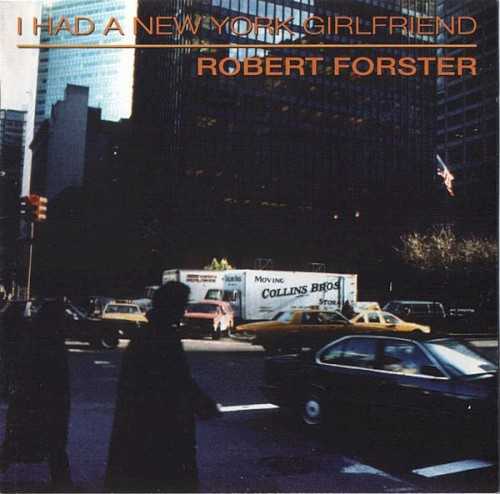 | Album: 3 of 8 Title: I Had a New York Girlfriend Released: 1994 Tracks: 12 Duration: 39:08 Scroll: Up Down Top Bottom 25% 50% 75% Spotify Allmusic Wikipedia AlbumCover | 1 Natures Way (02:26) 2 Broken Hearted People (03:48) 3 Echo Beach (02:54) 4 Tell Me That It Isnt True (02:37) 5 2541 (03:47) 6 Anytime (03:56) 7 Locked Away (03:28) 8 Look Out (Here Comes Tomorrow) (02:50) 9 Alone (03:13) 10 Bird (04:58) 11 Frisco Depot (02:37) 12 3 a.m. (02:29) |
| I Had a New York Girlfriend : Allmusic album Review : Forsters entry in the line of albums consisting of covers by other artists, along the lines of David Bowies Pin-Ups, makes for an interesting and at times defiantly anti-hip visit through a surprising, entertaining selection of songs. The lineup of the backing band varies from track to track, but a variety of old friends sit in, the one constant being Nick Cave regular Conway Savage on keyboards, with fellow Bad Seed Mick Harvey appearing on almost everything himself. Other fellow Aussie friends and musical fellow travelers -- Dirty Threes Warren Ellis, the Blackeyed Susans Rob Snarski, and more -- pop up here and there as well, lending the album a feeling of a casual, fun get-together. Nothings sloppy about the performances, though. Forsters country & western jones is again clear, and everyone turns in at least competent and at best really noteworthy turns, whether its Graham Lees pedal steel on Guy Clarks "Broken Hearted People" or Charlie Owens dobro on the Bill Anderson-penned "3 AM." Forster himself salutes a range of worthy folks in his selection of remakes -- choosing names like Bob Dylan and Mickey Newbury might almost seem too obvious, but Forster and company do them proud. Some of the song choices are really inspired, selecting some unexpected contemporaries of Forster to pay tribute to. New wave icons Martha and the Muffins get the nod with a brisk, quietly passionate take on "Echo Beach," Ellis adding some sharp violin to the proceedings, while a take on Husker Du drummer Grant Harts solo debut single, "2541," makes for another gently energetic highlight. The real surprise -- and almost as a result, the albums top winner -- is the piano/vocal-only take on "Alone," Hearts AOR mid-80s power ballad hit, turned into a effective, stripped-down meditation on romantic solitude. | ||
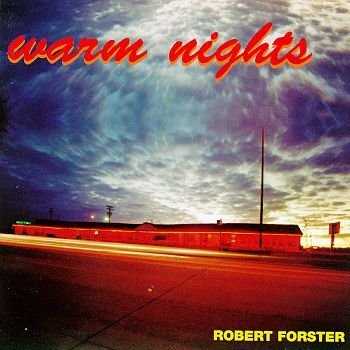 | Album: 4 of 8 Title: Warm Nights Released: 1996 Tracks: 10 Duration: 44:34 Scroll: Up Down Top Bottom 25% 50% 75% Spotify Allmusic Wikipedia AlbumCover | 1 I Can Do (02:59) 2 Warm Nights (04:25) 3 Cryin Love (05:26) 4 Snake Skin Lady (03:35) 5 Loneliness (03:21) 6 Jug of Wine (06:03) 7 Fortress (04:57) 8 Rock n Roll Friend (05:13) 9 On a Street Corner (05:29) 10 Ill Jump (03:01) |
| Warm Nights : Allmusic album Review : Produced by Edwyn Collins, a longtime acquaintance of Forster from their Orange Juice/Go-Betweens days on the Postcard label, Warm Nights continues the string of wry, sharp romance from Forsters other solo releases. The flavor of Warm Nights is a touch less obviously country-pitched in comparison -- more of the deft, understated rock/pop that the Go-Betweens were known for more returns, though occasional acoustic steel guitar breaks and the like show that Forster hasnt turned away from that approach entirely. If anything, though, the most notable guest musical work comes from a different angle, with five separate folks credited for a variety of brass instruments (tuba, trombone, and the like), plus another guest on cello. Collins himself helps lead the core band backing Forster, and both his performance and production emphasize a calm, wiry approach thats very direct, going so far as to leave in the occasional glitch or audible tape edit. Forsters singing is extremely clear and straightforward, sounding like hes singing right in a listeners ear, without being overbearing (though theres a hint of over-modulation on the recording once or twice). Musically, touches like rough guitar solos buried under echo and the New Orleans jazz horns on "Fortress" give Warm Nights a comparative depth, balancing the immediacy of the music with greater detail. One song worthy of attention is "Rock n Roll Friend," a Go-Betweens rarity turned into a low-key anthem (though admittedly the organ soloing could easily have been lost without hurting the performance). Other notable tracks include the title cut, a quick, nervous kick, and the light R&B;/funk groove of "Jug of Wine." Warm Nights itself turned out to be the last album Forster released before the Go-Betweens reunion, but as the end, for now, of his solo career, its a worthy effort. | ||
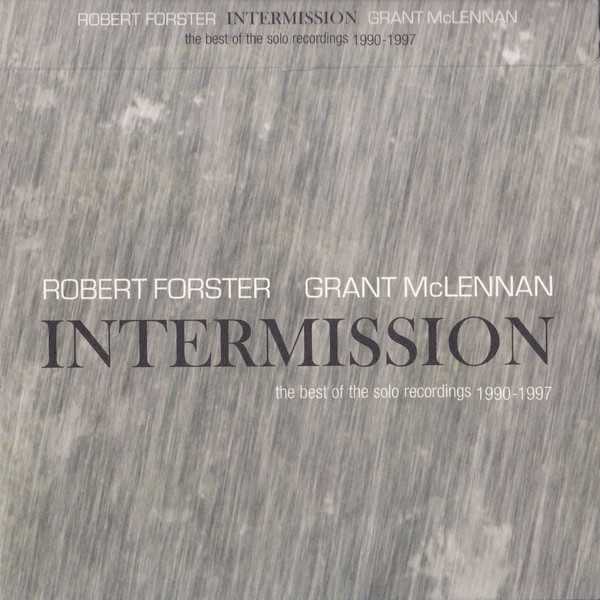 | Album: 5 of 8 Title: Intermission: The Best of the Solo Recordings 1990-1997 Released: 2007-06-18 Tracks: 26 Duration: 1:44:16 Scroll: Up Down Top Bottom 25% 50% 75% Allmusic AlbumCover | 1 Falling Star (04:05) 2 Baby Stones (04:06) 3 121 (03:29) 4 Ive Been Looking for Somebody (04:19) 5 Ill Jump (03:01) 6 Beyond Their Law (05:03) 7 I Can Do (02:59) 8 The Circle (03:44) 9 Cryin Love (05:26) 10 The River People (03:25) 11 Frisco Depot (02:37) 12 Danger in the Past (04:50) 13 Falling Star (original version) (04:04) 1 Haven’t I Been a Fool (03:23) 2 Easy Come Easy Go (04:00) 3 Black Mule (04:45) 4 The Dark Side of Town (03:44) 5 Lighting Fires (03:35) 6 Surround Me (03:54) 7 No Peace in the Palace (04:15) 8 Hot Water (03:47) 9 Ill Call You Wild (04:41) 10 Horsebreaker Star (04:11) 11 Malibu 69 (04:46) 12 One Plus One (02:59) 13 In Your Bright Ray (04:56) |
| Intermission: The Best of the Solo Recordings 1990-1997 : Allmusic album Review : When Grant McLennan passed away suddenly in 2006, the Australian group the Go-Betweens, one of the greatest bands -- perhaps the greatest band -- of the original indie pop era lost one of its two songwriters and vocalists. Robert Forster, the bands other lead half, lost his most important musical partner and foil. Forster was the more erudite and conceptually ambitious of the two in his lyric concerns, walking the musical line between Jack Kerouacs desolation, William Butler Yeats romanticism, and Kris Kristoffersons observational acumen of loss and the willingness to reflect upon it. McLennan was earthier, rooted deep in everyday life, in the news, and in urban myth as metaphor -- he created a simply direct kind of elegance in his songs where love, landscape, and the inner workings of both heart and mind were held in equal balance even if he was looking outside the first person. Certainly he had his influences, but they were colored over by his ability to communicate simply, directly. His romantic songs captured within them the sheer artfulness of the moment when meaning opens into epiphany. The Go-Betweens were one of those bands that knew when they hit the wall -- right after their masterpiece, 16 Lovers Lane, in 1988. They went on a 12-year hiatus, returning with Friends of Rachel Worth, and were gloriously active until McLennans passing. During the 1990s, both songwriters released solo records. Each of them issued four albums, though one by Forster -- 1995s I Had a New York Girlfriend -- was a covers record. Intermission, a double-disc collection on Beggars Banquet, documents the solo albums beautifully, giving each songwriter a single and separate disc. The package is accompanied by a very handsome lyrics booklet and comes in a slipcase. Planned before his death, one of McLennans last musical acts was to choose the 13 songs for his volume. Presented in this way, as opposed to pairing up individual albums or contrasting the Go-Betweens songs to highlight their differences, makes it possible for listeners to consider each man as an artist in his own right. Forster wisely chose four cuts each from his Danger in the Past debut and Calling from a Country Phone, three from Warm Nights, a cover of the late Mickey Newburys "Frisco Depot," and the original version of "Falling Star." Forsters gentility walks the line between rock, pop, and a kind of particularly Australian country-folk-rock. He offers stories of broken love, missed opportunities, and malaise, though somehow, because of his acumen with writing hooks and melodies, these never seem particularly dour or depressing. As for quality, this really is the best of the best. He has chosen to include the demo and released versions of "Falling Star," which -- despite the words remaining the same -- are very different songs. Also here are the gorgeous "Baby Stones," the 12-string-drenched "The River People," and the bluesy rocker "121." His reading of "Frisco Depot" is the best version done outside of Newburys, period. McLennans volume is a wide-ranging and restless set, containing three cuts each from 1991s Watershed, 1994s Fireboy, and 1997s In Your Bright Ray, and four from 1994s brilliant Horsebreaker Star. Interestingly, here is another contrast -- while McLennan sequenced his songs chronologically, Forster did not, choosing an aesthetic order instead. Theres a lot of first-person narrative here. "Easy Come, Easy Go" features a Rickenbacker electric 12-string guitar, a Wurlitzer, crackling snare drums, and a simple bassline -- all thats needed to illustrate a song about detachment, where the protagonist moves between what hes learned and passing it on to another. The spooky "Ill Call You Wild" is an allegorical morality tale, first-person Jungian analysis, and archetypal love song. "The Dark Side of Town" is one of the great rootsy pop songs thats rarely been heard, with its blend of gentle keyboards (representing a flügelhorn) and airy layered guitars. "Black Mule" is almost a country song, but its six-string guitar hook is infectious; its refrain is so simple, like something from Bob Dylan -- especially with the harmonica fill that precedes the second and third verses. Even jaunty tunes with drum loops, such as "Surround Me," are perfect in their laid-back expressionism, balanced emotional equity, and utter hunger for fulfillment. Unfortunately, neither Forsters nor McLennans albums are in print in America, and havent been for quite some time; they fetch hefty prices when one can find them at all. Its too bad, because this easy shuffling pop/rock accenting hooks and melody with lyric content doesnt get overly bogged down in imagery or artifice (although they are certainly used potently), despite their different styles. This set is, in its way, as important as the Go-Betweens later albums at the very least. They began in the wake of a dry spell for the group, and ended up as beautiful, moving, and idiosyncratic portraits of each man as an individual artist, as both writer and recording artist -- and eventually led them to perform together and finally re-form the band. This volume is as good as its going to get for a bit and should be pursued by anyone ever interested in the Go-Betweens, sure -- but even more so, interested in truly great pop songwriting that is timeless despite genre, period, down under locale, and, in this century, relative -- and certainly undeserved -- obscurity. | ||
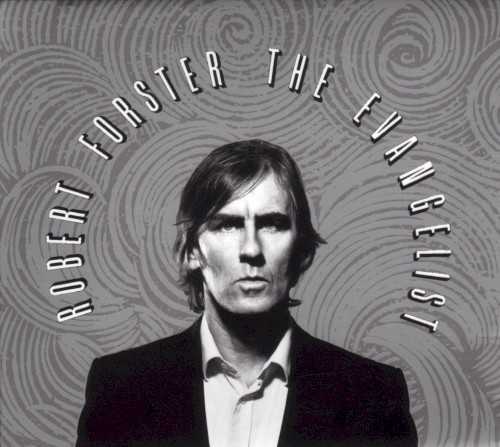 | Album: 6 of 8 Title: The Evangelist Released: 2008-04-04 Tracks: 10 Duration: 40:01 Scroll: Up Down Top Bottom 25% 50% 75% Spotify Allmusic Wikipedia AlbumCover | 1 If It Rains (03:47) 2 Demon Days (03:40) 3 Pandanus (03:58) 4 Did She Overtake You (03:24) 5 The Evangelist (04:29) 6 Let Your Light In, Babe (04:43) 7 A Place to Hide Away (02:35) 8 Dont Touch Anything (04:10) 9 It Aint Easy (03:28) 10 From Ghost Town (05:41) |
| The Evangelist : Allmusic album Review : The Evangelist by singer and songwriter Robert Forster is his first solo recording in 11 years. It may not be a record he ever planned to make at all after the unexpected death of Grant McLennan, his collaborator for over 25 years in the Go Betweens. The band had released and was on tour for Oceans Apart, a masterpiece surpassed only by 16 Lovers Lane, if at all. Forster and McLennan had begun writing a new Go Betweens album in 2006, when McLennan passed away in his sleep from natural causes just shy of his 47th birthday. Three of the songs on this album were co-written by the pair and contain McLennans final lyrics. That said, The Evangelist is not an elegy or a conscious homage to McLennan. The remaining Go Betweens -- bassist Adele Pickvance and drummer Glenn Thompson -- make up the core band, with a small string section arranged by Audrey Riley (who did them for the Liberty Belle and the Black Diamond Express). Pianist Seamus Beaghen lends a hand on keyboards. Mark Wallis and Dave Ruffy produced The Evangelist. So is this a Go Betweens record without McLennan? No, but its close, and it is certainly a new brand of Forster solo album. Forsters writing here is quite different than on his previous offerings. Always a poetic writer, his allusions, metaphors, cultural archetypes, and literary aspirations -- which appeared in his solo material and sometimes in the Go Betweens as well, but the latters were always tempered by McLennans earthy approach -- are all but absent on The Evangelist. Instead, Forster has never been this direct before, so unadorned and honest, and yes, vulnerable without the mask of his gift to weave a story, even in first person, and make himself seem a narrator. These songs are conversational; they express what the protagonist is feeling as a way of opening a dialogue with the listener. The Evangelist is not an elegy or simply some tawdry memorial, but it is a living testament to the influence and camaraderie McLennan brought to Forsters life and work. The ten-song, 40-minute set begins with "Let It Rain," introduced by the sound of a small chord of a droning Casio. Electric guitar chords shimmer and softly ring into the foreground slowly and deliberately. As the bassline all but whispers in the backdrop, Forster opens his mouth and unlocks the door to everything that follows: "If it rains, now well change/Well hold and save all of what came/We wont let it run away/...If it rains/different this time/We wont break the chain or make our own rain/Well just take what came/If it rains. Well worship again...Well be thankful for what came..." An acoustic guitar and the sound of a thunderstorm eclipse the electric one, and suddenly, it just ends. Its a gentle manifesto, not an anthem. "Demon Days," one of the songs written with McLennan, is almost purely his. It looks sadly and tenderly into the void. It is tempting to read this as perhaps an unwilling goodbye. That said, its actually a simple look at being middle-aged with the nagging feeling that "somethings not right/somethings gone wrong." Here Forsters enunciation shapeshifts, allowing for McLennans voice in the tune to come through clearly, illustrated by strings, acoustic guitars, a celeste, piano, and a contrabass and the final underscoring of a gentle, pop-laden backing chorus of hushed voices. Its deeply effective, sad beyond belief, but Forsters ability to channel his late friends manner of acceptance as a natural part of the baggage of life is remarkable, and deeply moving. He shifts gears immediately with "Pandanus," one of the finest tracks hes ever written. Its got a midtempo, elegant rock hook, accompanied by Adele and Glenn: this is a Go Betweens song if ever there was one, with a shimmering Beach Boys-styled backing chorus and a stridently graceful, unforced articulation of the melody which lets his lyrics just fall into the listeners lap: "...I love the shades of nightfall, the faded blues and grays/The silver on the water, seems to push so many things away, all away..." "Did She Overtake You" is one of those trademark busted love songs, where the potential for bliss is lost and covered over by the reality of not paying close enough attention to ones beloved. The narrator is asking the protagonist a question, and with layers of guitars a winding bass and simple kit drums, the only answer that comes is a sigh. The title track is so gorgeous it seems like a sin to even discuss it. Its among Forster greatest confessionals, that as it accepts responsibility and atones for its presumption and ignorance, and allows for the possibility of transformation because, if its not to late, the protagonist can actually hear the voice of his Beloveds heart. The strings and acoustic guitar with that lilting piano line make it one of the most breathtaking moments on the disc. McLennan wrote the chorus on "Let Your Light In, Babe," and its obvious. Its a jaunty, sunny pop stroll with the Go Betweens and Gill Morley on violin. Forster took the chorus and wrote the entire song in McLennans musical and even lyrical vernacular. The same goes for "It Aint Easy," the hardest rocking cut on the set. Its jangling guitars and run-on lines are a wonderful combination of McLennans rocked up pop and Forsters ability to tell a story, resolved in every chorus by Grants return to the basics. Here again, this is a Go Betweens tune with help from Morley on violin and Seamus on the B-3. Forsters "From Ghost Town," with Adele on backing vocals, closes the album. Its a long-winding sad story, played on the piano with string accompaniment -- the arrangement is glorious. Its the song Forster has perhaps written for McLennan but maybe there are others in it, too. Its very sad, extremely lost and confused but the line: "Its strong: yes, yes, yes, what we made for a thousand years/It will not fade/No, no. no . . " Its a breathless and devastating way to end a record, to be sure, but its far from depressing. If anything, The Evangelist reveals Forsters conviction to just go on and make music, even if its just this one recording (though given its quality and the empathic presence of the remaining Go Betweens, you hope not). If its an album of closure, then it is a way to wrap the package with a beautiful bow rather than letting it sit there like an open wound and be wasted away by the weight of time. Yet somehow, there is little finality here, and just an abundance of brilliant, emotionally communicable and translatable, adult pop music that does its best to practice acceptance and find beauty as one goes on living and creating even in the face of life -- altering tragedy. Bittersweet and poignant, The Evangelist is Robert Forsters most fully realized, seamless, and masterfully articulated solo record yet. | ||
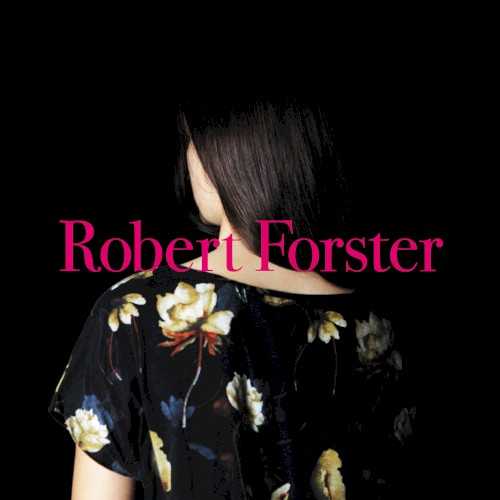 | Album: 7 of 8 Title: Songs to Play Released: 2015-09-18 Tracks: 20 Duration: 1:18:36 Scroll: Up Down Top Bottom 25% 50% 75% Spotify Allmusic AlbumCover | 1 Learn to Burn (04:36) 2 Let Me Imagine You (03:07) 3 Songwriters on the Run (03:16) 4 And I Knew (03:05) 5 A Poet Walks (04:59) 6 Im So Happy for You (03:50) 7 Love Is Where It Is (03:51) 8 Turn on the Rain (03:04) 9 I Love Myself (And I Always Have) (03:35) 10 Disaster in Motion (05:55) 1 Learn to Burn (04:36) 2 Let Me Imagine You (03:07) 3 Songwriters on the Run (03:16) 4 And I Knew (03:05) 5 A Poet Walks (04:59) 6 Im So Happy for You (03:50) 7 Love Is Where It Is (03:51) 8 Turn on the Rain (03:04) 9 I Love Myself (And I Always Have) (03:35) 10 Disaster in Motion (05:55) |
| Songs to Play : Allmusic album Review : Robert Forsters last album, The Evangelist from 2008, was steeped in grief and loss after the sudden death of his friend and Go-Betweens musical partner Grant McLennan. After its release, he retreated from active music making to write award-winning rock criticism thats been collected in the volume 10 Rules of Rock N Roll. He also compiled G Stands for Go-Betweens, the first of three retrospective box sets, and drafted his memoirs. Forster also produced records by Brisbane’s the John Steel Singers and Halfway. Scott Bromley and Luke McDonald from the former are part of the cast of multi-instrumentalists who assist Forster on Songs to Play. The remainder are violinist and singer Karin Baumler (his wife) and touring drummer Matt Piele. Recorded in analog with engineer Jamie Trevaskis, these songs are direct and kinetic, full of hooks, rich in metaphors and irony, and a sleight-of-hand confessionalism. The set opens with "Learn to Burn," a genuine rocker with a bumping vamp between electric guitars and violin, a pulsing bassline and ticking snare, hi-hat and bass drum: "Times a signal and you/Wait for changes/And the problem is ya know/I got no patience...Ill stop for petrol/And Ill stop for Dylan/But thats the limit when/I get moving…" Though rock & roll riffs are in your face, the quirky pop spirit of the Go-Betweens is never far away. It shines right through the sparkling romance in "Let Me Imagine You," the Jonathan Richman-esque "The Poet Walks" (complete with a mariachi trumpet solo) ("And given two choices/Two clear choices/I take both…"), and the deft, angular hook that brings on "I Love Myself and I Always Have." The latter is a song more bitingly honest than ironic with its skittering snare and country-esque outro. Many songs here contain another easily marked reference: the Velvet Underground of "Run, Run, Run," "I Heard Her Call My Name," "Who Loves the Sun," and "Lonesome Cowboy Bill." Forster makes no attempt to hide it; he weaves their impact on him tightly inside his own aesthetic sense for melody and clear-voiced, first-person narration. Other notable cuts include the jaunty, Farfisa-kissed rocker "Im So Happy for You," the love-worn reminiscence "Turn on the Rain," and the biting lament "Disaster in Motion." Songs to Play finds Forster at his most energetic and free. While this set cant be regarded as "unrestrained," these spirited, well-crafted songs offer rock & roll in a manner hes never even hinted at before. | ||
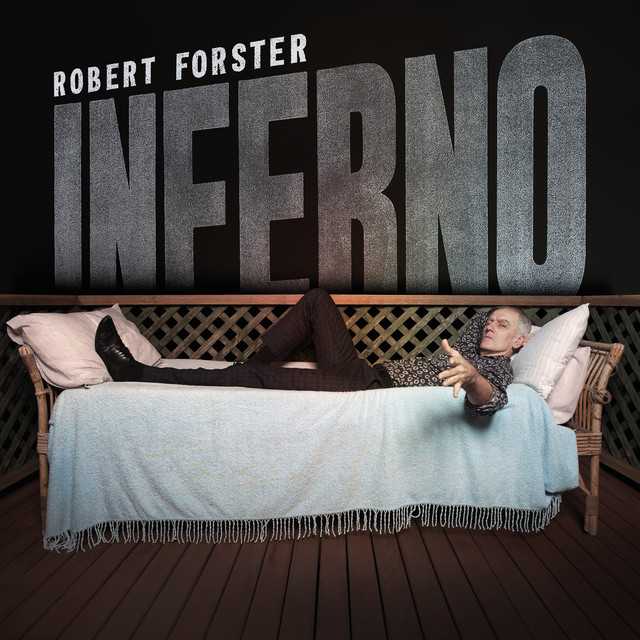 | Album: 8 of 8 Title: Inferno Released: 2019-03-01 Tracks: 9 Duration: 34:57 Scroll: Up Down Top Bottom 25% 50% 75% Spotify Wikipedia AlbumCover | 1 Crazy Jane on the Day of Judgement (04:41) 2 No Fame (04:27) 3 Inferno (Brisbane in Summer) (02:44) 4 The Morning (04:14) 5 Life Has Turned a Page (04:43) 6 Remain (02:55) 7 I’ll Look After You (03:12) 8 I’m Gonna Tell It (02:44) 9 One Bird in the Sky (05:13) |